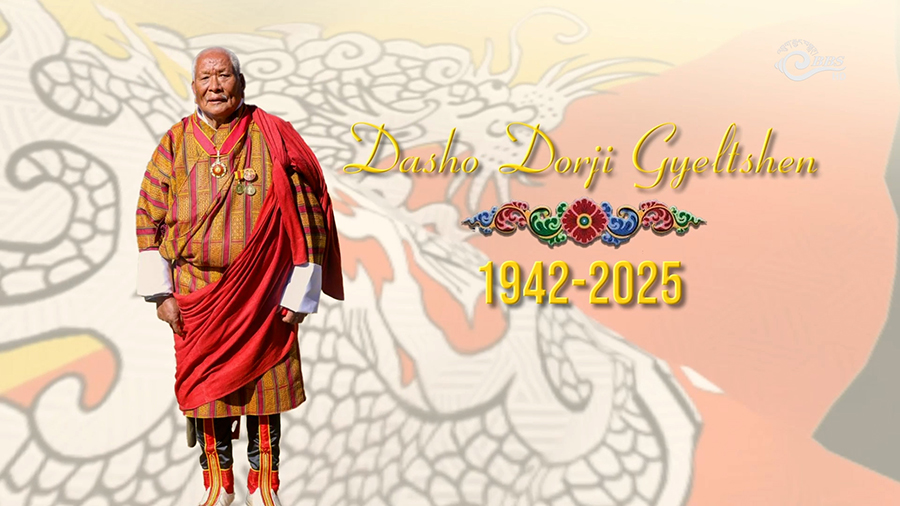 The state funeral for late Dasho Zimpon Dorji Gyeltshen was held today. His Holiness the Je Khenpo presided over the funerary prayers. In a quiet yet profound departure from tradition, the late Dasho chose modern incineration over open-air cremation, a decision that reflected both personal conviction and deep environmental concern.
The state funeral for late Dasho Zimpon Dorji Gyeltshen was held today. His Holiness the Je Khenpo presided over the funerary prayers. In a quiet yet profound departure from tradition, the late Dasho chose modern incineration over open-air cremation, a decision that reflected both personal conviction and deep environmental concern.
In a moment, heavy with emotion and honour, the Royal Bhutan Army folded the National Flag with solemn precision and placed it into the hands of Dasho’s family, as a tribute to late Dasho’s lifetime service to the Tsa-Wa-Sum.
The crack of rifle fire echoed across the still morning air as the Royal Bhutan Army offered a solemn guard of honour to late Dasho Zimpon Dorji Gyeltshen.
The ceremonial gun salute marked the beginning of a state funeral befitting a man whose lifetime of service spanned three reigns.
In a rare and symbolic departure from tradition, the late Dasho Zimpon chose incineration over the customary open-air cremation. This decision, according to Dasho’s son, is deeply personal and thoughtful, reflecting two of his most cherished convictions: care for the environment and dignity in death.
One of his most heartfelt concerns was the impact of traditional cremation practices on Bhutan’s fragile ecosystem. The use of juniper trees, shupi shing, to fuel funerary pyres has long been a cultural norm.
For the late Dasho, whose love for nature ran deep, he feared that the slow disappearance of these sacred high-altitude trees, especially from places like Chelela where he often camped, would one day erase both the spirit and the beauty of Bhutan’s landscapes.
According to his son, his connection to Chelela was not merely sentimental. Dasho was part of the team that identified a sacred site in the area and helped build a chorten to sanctify it, a testament to his reverence for the land. Choosing a cleaner, smoke-free incineration process, he believed, was a small yet meaningful step toward conserving the environment he so dearly loved.
The second reason for his choice was grounded in compassion. The late Dasho Zimpon believed the traditional practice of managing the body with long poles during cremation lacked the gentleness and grace the deceased deserved. It was a practice he found unsettling, one he had already reconsidered when arranging the farewell for his own daughter. By choosing incineration for himself, he hoped to inspire others to rethink how the dead are honored, placing dignity and respect above convention.
In his final act, late Dasho Zimpon Dorji Gyeltshen not only remained true to the values that guided his life, loyalty, humility, and deep moral clarity but also offered the nation a moment to reflect. His choices echoed his lifelong dedication to service, not only to the throne, but to the land and people he served with quiet conviction.
As Bhutan bids farewell to one of its most devoted sons, his legacy lives on, not only in the pages of history, but in the trees he sought to protect, the sacred sites he helped preserve, and the example he leaves behind: that even in death, one can serve a cause greater than oneself.
Samten Dolkar
Edited by Phub Gyem








